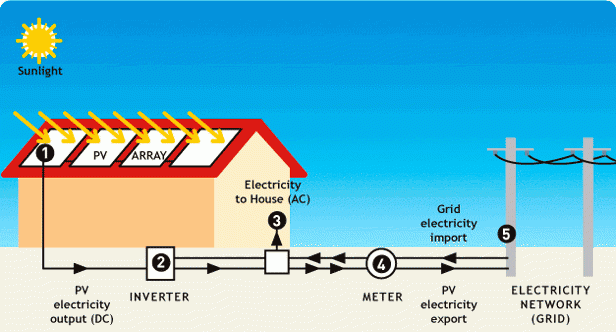
Before you install residential solar panels, it’s important to understand how they work. The simplest explanation is that solar panels work by converting sunlight into electricity, but there’s a little more to it than that.
Solar Impact is a leading solar panel installation company in North Central Florida with years of experience installing residential solar panels. In this blog, we explain how solar panels work on a house so you can gain a solid understanding of the science behind solar before you install them on your roof.
The Science Behind Solar Panels
Photovoltaic solar power converts the sun’s energy into electricity. Solar cells, or photovoltaic cells, are silicon-based pieces of material that absorb the sun’s light – not warmth as in a thermal application. Solar energy excites the electrons in the solar cell and electricity is produced. Solar cells are combined in solar panels, and groups of panels are linked to produce greater power.
How Solar Panels Work Step by Step
- Electricity generation: The solar panels convert sunlight (not heat) into direct current (DC) electricity.
- DC to AC conversion: An inverter then converts the DC electricity into 240-volt alternating current (AC) electricity suitable to power appliances in your house.
- Electricity usage: Your home uses electricity from the solar panels first. Then, if your electricity use is higher than the supply available from the panels, your system gets the extra power from the electrical grid.
- Excess energy: If your solar panel system produces more electricity than you use, the excess electricity is exported to the electrical grid, and your meter spins backward. Alternatively, the excess electricity is stored in a solar battery.
- Monitoring usage: A meter is used to monitor the electricity used from the electrical grid as well as the solar electricity your house supplies to the grid.
Types of Solar Installations & How They Work
Net Metered Solar
Connected to Grid
- Net metering is a state law that defines how solar interacts with the electricity grid.
- Under net metering, you can buy energy from the grid when the sun isn't out, and sell energy back to your utility when your solar produces more than you are consuming.
- No solar batteries or solar storage is needed—the grid is your perfect energy storage mechanism. You can, however, choose to install a battery and still participate in net metering.
- Provides the highest return on investment.
- Does not produce electricity when the grid is down.
Hybrid Grid-Tied Solar
Connected to Grid
- A net-metered solar installation that utilizes batteries for emergency backup power.
- Batteries power a critical load panel off the main breaker panel, designed to power your home's necessities.
- Batteries require maintenance (must be replaced every 5-7 years), and are a significant expense, but a hybrid system requires fewer batteries than an off-grid system.
- You are able to sell the energy you are producing but not using to your utility, providing a higher return on investment than an off-grid system.
Off-Grid Solar
Not Connected to Grid
- An off-grid solar energy system requires batteries to store energy and provide power.
- Batteries require maintenance (must be replaced every 5-7 years), and are a significant expense.
- You cannot sell unused power back to the grid, because energy never leaves your closed system.
- You are insulated from losing power since you are not reliant on the power grid.
The Benefits of Solar Power in Florida
Few power-generation technologies have as positive an impact on the environment as solar electric power. It quietly generates electricity from sunlight and does not produce any air pollution or hazardous waste. Solar doesn't require liquid or gaseous fuels to be transported or combusted. And its renewable energy source—sunlight—is free and abundant. That's a bright solution!
Solar installation can eliminate much of the electrical utility cost for your home or business and provide a secure return on your investment. Your system will be designed to meet your energy goals and to fit your budget. Solar Impact has the answer to your energy needs in North Central Florida.


FacebooktwitterLinkedin